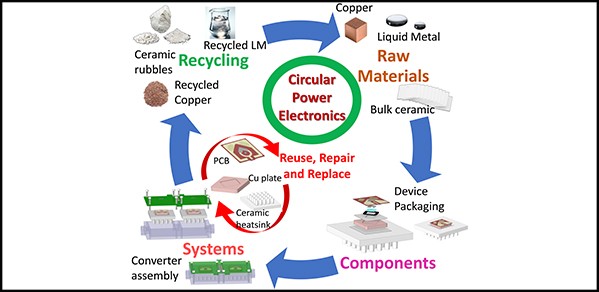
The University of Cambridge’s Electrical Engineering Division has been awarded £1.34 million to advance the next generation of sustainable power electronics fit for a low-carbon, circular economy.
Our vision is to create power electronics that are not only efficient and powerful but also designed to live multiple lives.
Professor Teng Long
The project, funded by the Engineering and Physical Sciences Research Council (EPSRC), aims to revolutionise how power converters are designed, built and reused – marking a major step toward circular and high-performance energy systems.
Globally, the world is projected to generate more than 74 million tonnes of electronic waste (e-waste) by 2030, a figure that underscores the urgent need for more sustainable design and manufacturing of electronic systems. Power electronics, which are central to renewable energy systems, transport electrification and data infrastructure, represent a rapidly growing portion of this challenge due to their complex, non-recyclable structures.
To help address these challenges, the research team, led by Professor Teng Long, will pioneer a new design paradigm for circular power electronics that integrates performance, reliability and sustainability from the outset.
The project, co-led by the Compound Semiconductor Applications Catapult, will develop innovative power electronic packages and converters that can be easily disassembled, repaired and recycled – extending their useful life and reducing e-waste.
Key technical breakthroughs will include:
- Ceramic-embedded power electronic packages for scalable converters with ultra-fast switching and superior thermal management.
- Floating die structures utilising liquid metal fluidic joints to mitigate thermomechanical stresses.
- Integrated fabrication processes enabling reusability, repairability and recyclability of all package components.
Industrial collaborators on the project include STMicroelectronics, MacDermid Alpha and Semikron Danfoss, providing critical materials, design expertise and validation support.
Professor Long, Principal Investigator from the University of Cambridge, said: “Our vision is to create power electronics that are not only efficient and powerful but also designed to live multiple lives. This EPSRC support enables us to explore a truly circular approach, one that integrates high performance with environmental responsibility.”

Advanced power module packaging method using liquid metal bonding and direct cooling. Credit: Teng Long

Project kick-off meeting held in Cambridge with the Compound Semiconductor Applications Catapult

